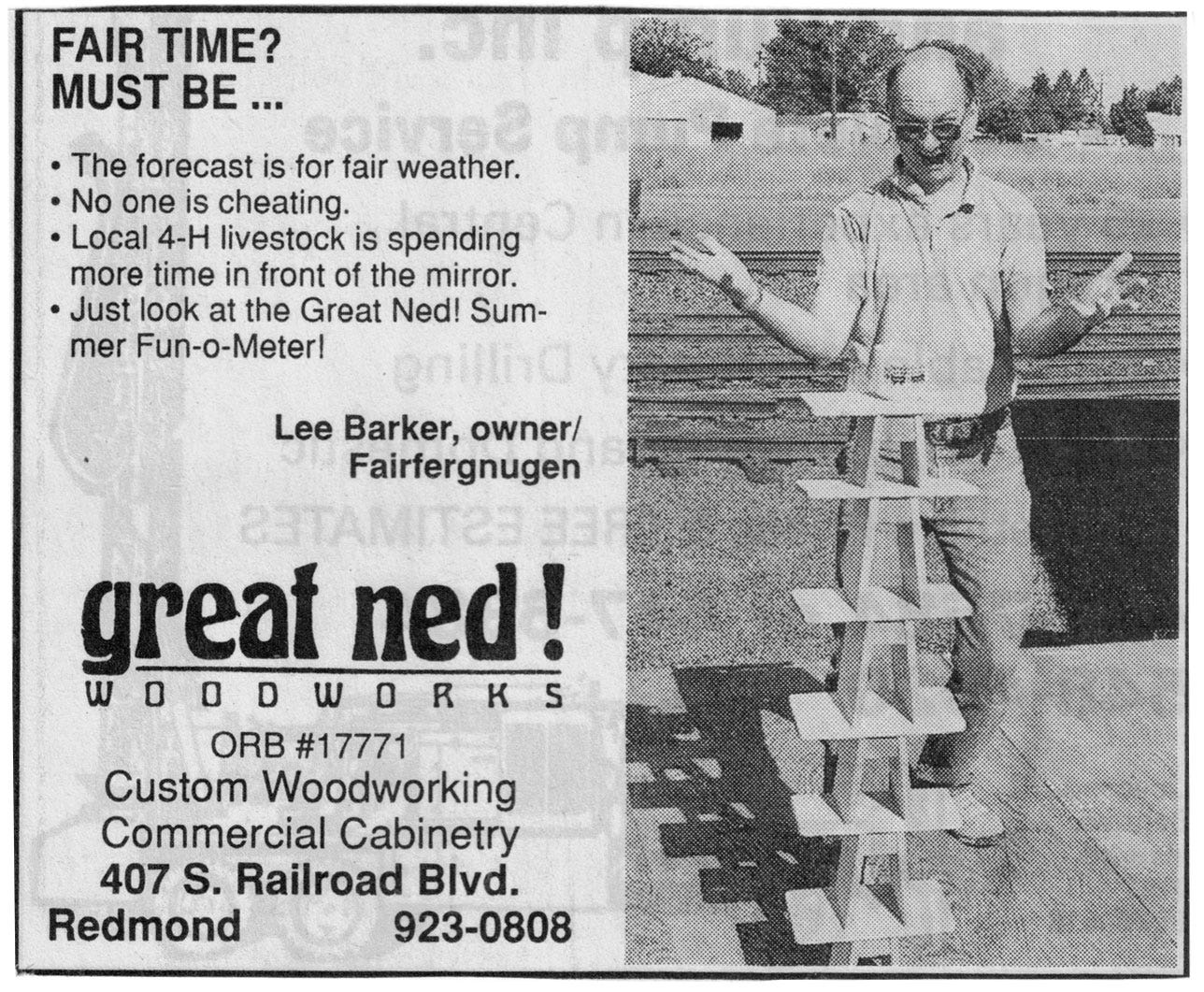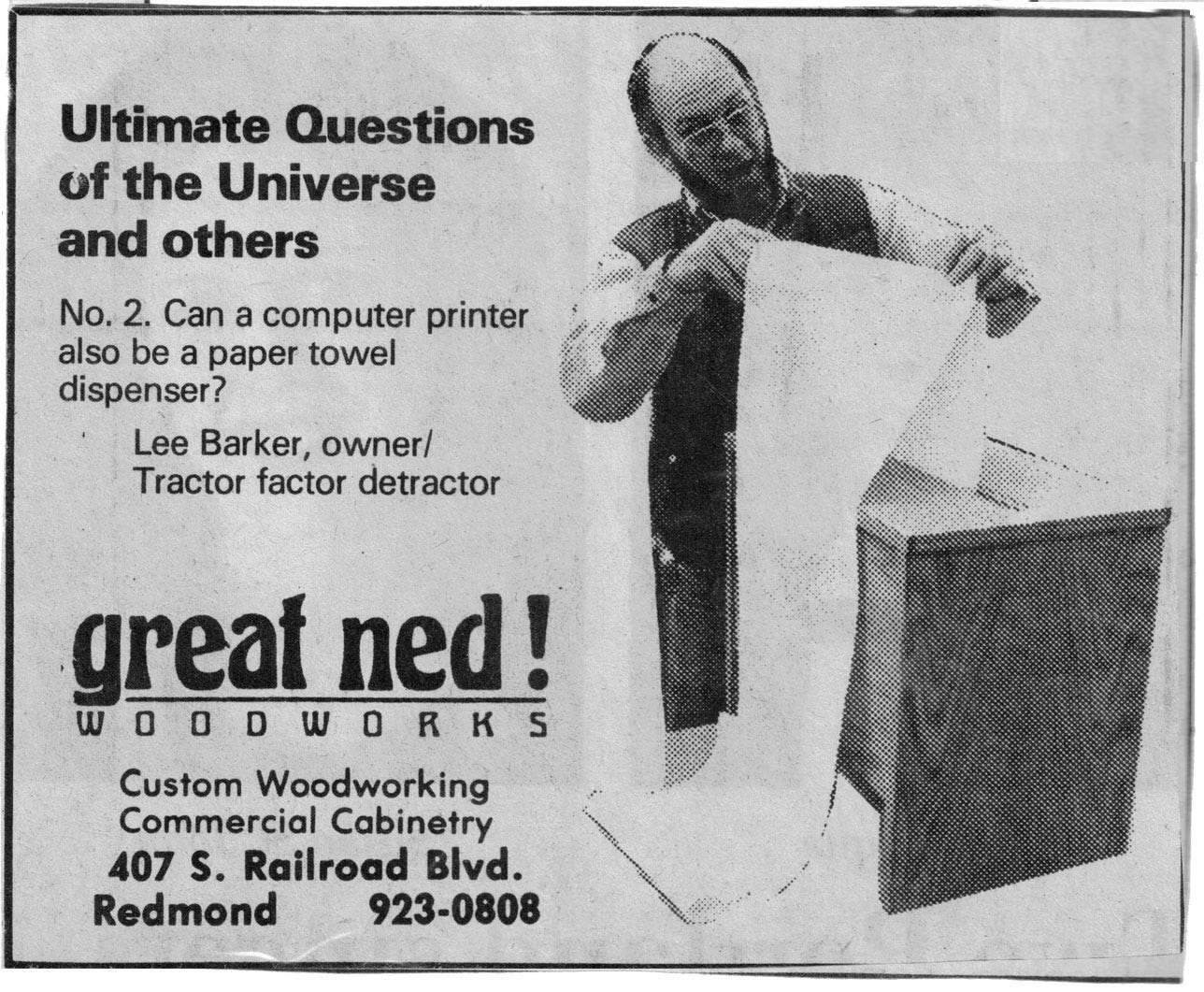I Learned Shopkeeper Capitalism From My Dad
Providing, not extracting
In the 80s and 90s in Redmond Oregon, you could get not just custom cabinets but any kind of wood-based problem solved at Great Ned! Woodworks. The sole proprietor (who was not named Ned and had no relationship to anyone named Ned) built all sorts of enduring pieces. You still seem them around here; great kitchens, keepsake chests, and a very large, very flat table used by an airplane manufacturer.
The marketing budget of this one man show was an off-the wall ad in the weekly paper featuring himself, something he made, and his enduringly curious sense of humor.
That was my dad. I am really proud to be his kid. He is a craftsman, a community member, and kept the family fed making things. His work life contributed to the world around him.
To me, that is the ideal of capitalism realized, and the pain of it. Sometimes his work life was very stressful; not just days when it was hard to make wood do the thing it needed to, but harsh economics. Realizing that he underbid a project and was going to lose money. Dealing with local, national, and global headwinds beyond his control. Balancing the company books and paying the house mortgage.
He did not become rich, far from it. But his work was always making something of significance for a customer — and making something silly for the newspaper.
When we were in primary school, Dad’s shop was our afterschool day care. My brother and I biked to his shop. He showed us how to build things with wood. We sat on the loading dock and ate peanuts while he picked splinters out of his hand with his pocketknife. At five p.m. we put the bikes in the back of his truck and drove home.
A few decades later he closed up shop to retire. He sold the tools to my step brother who took over the lease — and started a completely different business building medium-scale production wood items such as wine gift boxes and in-store displays.
Dad's business was made of him, and there was not much of it that had monetary value to sell. But Great Ned! was entwined in the community. People knew to bring in strange old pieces of furniture for repair. They knew to turn through the pages of The Redmond Spokesman to find the Great Ned! ad. People in town knew Dad before they ever met him because of those ads.
He has been retired for a few years now, has taken his building habits to his garage shop. He bought a welder and now makes strange objects out of metal, such as this device to shake spray paint cans.
I started a company 15 years ago. Our small team makes things out of words, not wood. I don't often produce tangible items in the real world. We craft digital "assets" for corporations. I don't directly serve members of my local community. In these ways Great Ned! was different than Lion’s Way.
The question of retirement is appearing on the horizon for me. It shifts one’s perspective, and I recently realized that I modeled my business after Dad’s. My self is at the center of what I sell. I have never "scaled" or sought out projects that could be automated to increase profits. Using our experience and skill, we make things of value in exchange for currency. It seems to be our family's model of capitalism. I like it, even though I don't see much evidence of such effort outside my immediate family.
I looked around and realized that not only my father and step brother, but my mother, grandfather, uncle, and cousin engaged in shopkeeper capitalism. They have all been Realtors. However much business they build, it is based on people trusting them individually. They can sell the name on the front of the building but it does not have that much value. The recurring customers know the person more than the logo.
My step sister is a massage therapist who runs her own one person shop, in the same town.
All of them contributed — and currently contribute — to their community just by how they operate their business.
They are shopkeepers, practicing capitalism in a noble way.
Though my work is firmly planted in the internet, I still think like them about community and business. While firms around me are scaling and building large books of clients and creating automated process, I am working directly with all my clients to get them the crafted product that they ask for.
I even take pride in not turning away small projects. If you bring in the marketing equivalent of an old broken chair, I will craft the word equivalent of a fix to help you.
I am not going to retire into cruise-around-the-world riches. I do not at this time have anything to sell from the business we made. When I look at my position from the point of view of "business best practices," I have missed the opportunity to scale to a greater number of digits and to make an attractive buyout business.
We never followed business best practice. I follow shopkeeper best practice. (I can not speak for my partner, whose different skillset is instrumental to our operations; I am amazed at my family members who can operate a business alone.) I make good things and hope for the market to reward me.
America’s opinion of business best practice is quite in the toilet right now. The businesses that are held up and discussed, that get attention and wealth, are software companies that rent the output of their secret code to you, change it at will, and make you reliant on their service.
They scale extremely well, they automate processes like champions. They are raking in money and the attention of investors. They are modeling what you should do with "business."
I would say that the consensus of the populace — heard both loudly on the rented software of social media and quietly in casual in-person conversation — is that it is not working for us.
The output of these businesses — neither product nor service, but just a brief experience they control — does not contribute to our communities. The shifting sands of the model make our world uncertain and unreliable.
But they collect money, taking it out of communities and consolidating it with investors. By the measure of a stock price, they are great businesses.
By that measure my business — and Great Ned! Woodworks, and Real Estate of Oregon, and Trout Realty, and Nedson Woodworks and Copper Sky — are bad business.
Let’s rethink capitalism. Few are happy with what is called capitalism right now.
I ask you; where do you see shopkeeper capitalism working around you? How can we, in our communities and in our governments, encourage more shopkeeper capitalism?
My work is not without sorrow and frustration, but I am very proud of Lion's Way. It stems from the work we produce every day, not the profits we make for others.
When Dad retired, he switched from building with wood to building with metal. I picture my one day retired self building different things with words (hopefully you are still reading Old Truck Good Coffee then) and still a part of community. I hope that I can walk into many a shopkeeper’s door and pay them for their expertise.
Post script: More on Great Ned!
My Dad Lee Barker wrote a delightful book, Plausible Gumption about his working career! It talks beautifully of the life of a shopkeeper.







Wonderful story, important argument, all beautifully presented. Thank you!
Full disclosure: I'm said dad. A point touched on by Joel, expanded: A local shopkeeper looks for reciprocity and nurtures it by buying local: not just raw materials, but also groceries and vacuum cleaner repair and oil changes. Those face-to-face encounters invigorate community like 16-16-16 lawn fertilizer in April in Oregon.
It's richness when you go buy school supplies for the kids and you know that the daughter of the lady waiting on you is raising a goat for 4-H and the guy running the hardware store next door has twin sons, seniors this year on the high school basketball team.